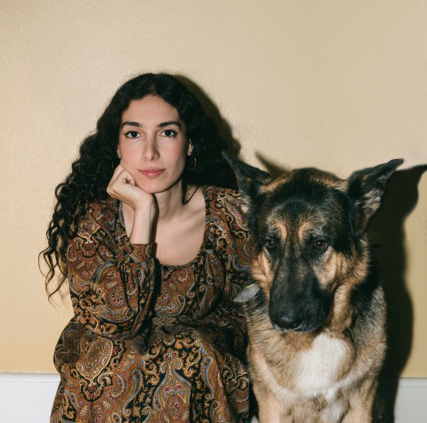Spotlight: Bedouine

photo by Antonia Barrowman
Azniv Korkejian never meant to write an album with so much bird imagery. But it happened anyway. “It wasn’t intentional at all,” the 34-year-old musician says of her new record, Bird Songs of a Killjoy. “I only became conscious of it after I amassed all these songs.”
It’s this type of thinking that has guided Korkejian’s career, which didn’t start in earnest until after she turned 30. Her incredible backstory, though, illustrates how serendipitous it was from the outset.
Born in Aleppo, Syria, Korkejian moved with her family to Saudi Arabia when she was very young, where they lived on an American compound. She started taking piano lessons when she was five but didn’t truly latch on to the instrument like her mother would have hoped. The family relocated to the United States when she was 10, landing first in Boston before settling in the suburbs of Houston. Korkejian once again flirted with music in high school, playing trumpet in her school’s marching band. “I realized in my late teens that it was actually cool to have musical skills,” she recalls. “But it wasn’t until college that I had a guitar of my own. It was really intuitive.”
Korkejian continued wandering throughout her twenties. She spent several years on a farm in Kentucky, living with a friend’s mother whose son was set to attend Savannah College of Art & Design in Georgia. On a chance visit to the school, she was offered a scholarship and, in 2011, she graduated with a degree in sound design, before relocating to Los Angeles soon after to try her hand in the entertainment industry. For several years, Korkejian worked as a dialog editor for television and movies.
Throughout those years of cross-country living, she started writing songs on the guitar that she would eventually collect for her 2017 debut breakout, Bedouine. For that, Korkejian teamed up with Gus Seyffert (Norah Jones, Sia), who she met via the Los Angeles music scene that she was hanging around. Together, along with a backing band that included Beck’s longtime guitarist Smokey Hormel, they crafted a stunning collection of wispy folk tunes that defy any particular place in time—but certainly have echoes of the greats like Joni, Joan and Emmylou. At the forefront is Korkejian’s voice: It’s a bit deep, but one of the things you notice immediately is that she sings with vulnerability and tenderness, while also displaying a sense of daring confidence. Her album was a critical hit and she soon found herself playing gigs all over the world with Fleet Foxes, Real Estate, Father John Misty and Michael Kiwanuka.
Korkejian chose the stage name of Bedouine as an homage to her nomadic upbringing, a concept that always brings her back to her roots. “Maybe it was because of my mom—she had so much Bedouin jewelry,” she says. “We had such an ex-pat life. We were living around mostly Westerners. But you hear the prayers five times a day. There’s no escaping it. The culture was always around.”
For Bird Songs of a Killjoy, Korkejian continues down the folk path of her first album, with a bit more orchestration mixed in, giving the album a lush and, at times, otherworldly feel. And Korkejian says the pressure of a sophomore LP was on.
“I was definitely more conscious of it, which is bittersweet,” the singer says. “[For] the first album, I wasn’t so conscious of deadlines. There’s just something really magical about the process when you don’t have to think about that stuff. I can only imagine it enters your psyche.”
And back to the bird thing: Along with the album’s title, three songs, “Bird,” “Bird Gone Wild” and “Hummingbird,” anchor the middle of the set. They’re gorgeous stories, often touching on narrowly avoided loss, set to flourishing strings. But the true highlight comes right at the beginning: “Under the Night” starts off sounding like an homage to that time Korkejian spent in Kentucky, missing the horses, missing the night sky, missing life in the slow lane. A quiet, acoustic guitar anchors her voice before a faint rhythm kicks in with some fluttering strings. But it’s not really about a lost place; it’s the metaphorical loss of a hope that never came to fruition: “Are we two people never getting together/ I will follow your roads/ As wide as the air, as wild as a storm,” she sings in the chorus.
Korkejian’s creative streak doesn’t seem to be coming to a halt any time soon, either. She says she’s always writing and has a song bank that she plucks from when it’s time to record again. “I think all my records will be gradual,” she says. “For the next record, I already have a lot of songs I didn’t get around to.”
This article originally appears in the June 2019 issue of Relix. For more features, interviews, album reviews and more, subscribe here.



















